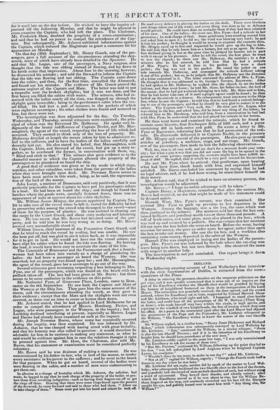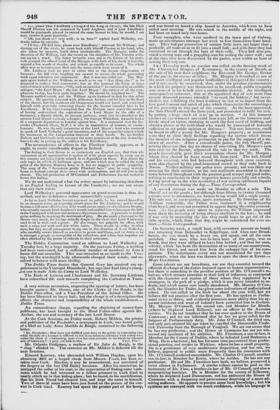IRELAND.
The following amusing account of Lord Wellesley's first intervietr with the civic functionaries of Dublin, is extracted from the corre- spondence of the Times.
A delay in entering the presence-chamber set the corporate politicians on the qni rice, and it was speedily ascertained that it arose out of an inquiry on the part of his Excellency whether the Sheriffs elect would be gratified by having the honour of knighthood bestowed on them at the inauguration of the Lord Mayor. The intimation was gratefully received, the door opened, and the crowd entered, where his Excellency sat in state, supported by Colonel Merrick Shaw and Mr. Littleton, who stood right and left. I happened to stand close beside. the latter, and could hear all the promptings of Sir W. Betham (Ulster King at Arms), who made himself very busy within the circle, in high spirits, and rejoicing in the windfall of two knighthoods, the fees of issuing which drop into, his office. At a pause in the ceremonial (just after the Lord Mayor had abjured the pretensions of the Pope and the Pretender), Mr. Littleton whispered to Sir William, " His Excellency wishes to know the names of the two Sheri
elect."
Sir William replied, in a similar tone, "Drury Jones Dickenson and Richard Baker," which information was subsequently conveyed to Lord Wellesley by Mr. Littleton. " But," continued Sir William, in a similar whisper, "there is also the late Sheriff Preston ; and if it is the intention of his Excellency to knight him, he should have precedence of the new men."
Mr. Littleton coldly replied in the same low tone, "I was only commissioned by his Excellency to ask the names of those two."
"But Mr. Preston," continued Sir William, following up the point that led to his fees, "was left unknighted by Lord Anglesea when he knighted Captain.
Lynar, his coadjutor." "Wouldn't three be too many to make in one day?" asked Mr. Littleton.
" Not at all!" replied Sir William, eagerly; " George the Fourth made half
dozen in one day when he was here."
Mr. Littleton did not reply, neither did lie speak of the matter to Lord Wel- lesley, who subsequently beckoned the two Sheriffs elect to the foot of the throne, and gracefully laid the sword of state on both shoulders of each, but without using a word of ceremonial. They bowed their thanks, and silently retired ; after which his Excellency moved as if he was about to rise, but Sir William Be- tham lingered on the step, and anxiously stretched out his face till the Marquis caught his eye, and politely leaned over to meet him with " Any thing else, Sir
William?"
•• Yes, Please your 1.xmllency (whispirsd the King at Arms); the late High Sheriff Preston wan ]cut unnoticed by Lord Anglesea, and it your Excellency would be graciously pleased to extend the same honour 'to him, he would, 1 ant sure, receive it most gratefully." " Oh, you think so? very well; is he here?" replied Lord Wellesley, evi- dently taken by surprise. la • " I'll try—I'll find him, please your Excellency ! returned Sir William; and darting out of the circle, he came hack with Sheriff Preston in his hand,.who, - also taken by surprise, knelt down mechanically. The Marquis, under the direction of Sir William, laid the 'sword on the shoulders of Mr. Preston with- ' out saying a word. The latter instantly rose,- and in the fulness of his grati- tude grasped the offered hand of the Marquis with both of his, shook it heartily, uttered a few words of thanks, and retired as rapidly as he came. The whole affair was so instantaneous that only the inner circle were aware of it. Mr. Littleton tcolc no part in either • this or the former dispensation of honours: his full clear laughing eye seemed to survey the whole proceeding
• with equal toleration and amusement. But it was not ended vet. The Mar- Avis again looked at Sir William, as much as to say "Any thing else?" as he prepared to make a final movement ; but at this moment the King at Arms seemed struck with remorse—."Oh, such an omission I" he exclaimed in an audible whisper, " the Lord Mayor ! the late Lord Mayor ! the subject of all the com- pliments to-clay, has been quite forgotten ! He should be knighted too I" The Marquis nodded ascent, and Sir William again hastened to look for this other subject. He speedily returned with Alderman Archer, and led him to the front of the throne, but the stubborn old Orangeman would not kneel, and contented himself with gratefully returning thanks for the honour intruded hint by his Excellency. 'It has since transpired that the Marquis must repair the mistake of having undervalued the aspirations of a Lord Mayor by the offer of a baronetcy, a dignity which, to prevent jealousy, must also be extended to the present Lord Mayor (already a knight), Sir George Whiteford, formerly leader -of a corporate deputation to London against him. It is rumoured that the Re- , corder (Frederick Shaw, M.P.) is also in expectation of honours or emoln- laments. lie was the only corporator at the Lord Mayor's feast who ventured to speak of Lord Wellesley's good intentions, and of the respectful return which
his treatment. of the Corporation deserved at their hands. Ik, his brother Robert, and his friends were amongst the most prominent at the city Assembly- house to-day in getting up the address to his Excellency.
The accumulation of offices in the Plunkett family appears, as it ought, to excite considerable disgust in Ireland.
The feeling in their favour is so exclusively an English one, that their ad- vancement on all opportunities is spoken of with great asperity by every one in this country not immediately related to or dependent on them. It is almost the only topic on which all Irishmen agree, and one which may be called the weak point of the Reform Ministry here, as it has no support in public sympathy. f he song of the " Seventeen pretty Plunkett boys" may be sting in every house in Ireland (except their own) with acclamations, and all will join in the -chorus. The late promotion of M'Causland and Fetherstone has not tended to lessen this feeling.
We do not understand what the writer means by intimating that there is an English feeling in favour of the Flunketts ; we are not aware that any such exists.
• Lord Wellesley's personal appearance on grand occasions is thus de- - scribed, and his deticienees rather unmercifully exposed.
As far as Lord Wellesley his yet appeared in public be has proved himself to be an eloquent actor, an imposing mouth-piece for Mr. Littleton ; and be would become a still more eire.etive one if he would get an entire set of teeth from Brophy, • who actually remade Lord A uglesea's mouth and enabled Mtn to harangue the '28t11 in the Castleyanf with ease and accuracy of pronunciation. A governor in behind gains nothing by in:piling-the sentiment of pity. He also needs a footstool to the throne very much, for his legs actually dangle in the chair that Lord Whitworth used to sit in with such a grace. Ile also rouges too palpably for effect, with such a voice. and with such few white hairs. These would be trifles to other men, but they are of consequence to any one in the situation of La(' 'Wellesley, who candidly avows himself so sensitive to praise and blame, and set down as lie Is amongst a people so susceptible of the ridiculous, and whose best impulses are often checked by the power of ridicule in their associates.
The Dublin Corporation voted an address to Lord Wellesley on Tuesday last, by a large majority. On the previous Friday, a meeting had been summoned, but a sufficient number of members to fern] a house did not assemble. This was intended as an insult to the Vice- roy, but the worshipful body afterwards changed their minds, and re- solved to behave with more civility.
The Dublin Times denies that General Grey has received any ap- -pointment in the Viceregal Household; but says that Earl Grey's young- ...est son is made Aide-de-Camp to Lord Wellesley.
The Earls of Leittim and Charlemont and Mr. Secretary Littleton have subscribed 201. each towards completing the Cathedral at Tuam.



















 Previous page
Previous page